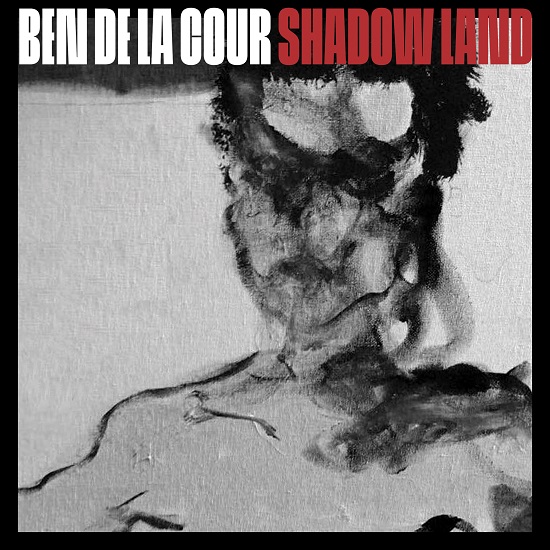
Authenticity’s something that’s often claimed but not always delivered. Not in this case; “Shadow Land” is a powerful and often disturbing collection of songs with a wide variety of themes. And the authenticity isn’t just in the lived experience of Ben de la Cour, although his life suffuses the songs. It’s also in the way the album was made; virtually all of it was recorded live. Brave, perhaps, but vibrant and raw when it’s done well. On “Shadow Land”, it’s done very, very well.
This isn’t a gentle, introspective album of reflective songs tinged with melancholy like Jackson Browne and James Taylor in the seventies. Their hell-raising generally didn’t make it directly into the songs (unless you count “Cocaine” on “Running on Empty”). With Ben de la Cour, it’s a different matter. It doesn’t matter how deep the barrel is, he’ll siphon out the most bitter dregs, then create potent songs from them. If you wanted a more current comparison, Ben has a lot in common with Michael McDermott both in the life lived and in the breadth of musical stylings they use to get the songs across.
“Shadow Land” moves effortlessly from the gentle triple-time pathos of another barely-mourned suicide in “Swan Dive” to the terrifying, hallucinatory “Harmless Indian Medicine Blues” sounding like a half-speed, minor key “Telegram Sam” played by Black Sabbath, with a side order of raw sax. And while we’re on the subject of terrifying, “Basin Lounge” is a full-on, full band romp through the story of a night in one of those bars that sensible people don’t visit, complete with cocaine references. It’s on the edge of falling apart at any time and conveys the stimulant headrush perfectly when the manic guitar solo kicks in.
The album isn’t just about the personal. There’s a smattering of murder ballads in there as well. The album opens with “God’s Only Son”, the tale of double-crossing bank robbers set to an Ennio Morricone-style arrangement, complete with whistling and mandolin while “Amazing Grace (Slight Return)” is a much more mellow take on a hushed-up murder in a small town. There’s also a takedown of corporate greed in the swamp-rock of “In God We Trust … All Others Pay Cash”, but the focus is mainly on the searingly honest depictions life in general and of the Janus faces of dependency and recovery in particular.
Two of the standouts in this vein are “The Last Chance Farm”, a gentle, bleak story of two characters meeting in rehab and the title song with its dystopic alienation and a perfect description of eternal damnation: ‘The Revolutionary Suicide Jazz Band plays all night long’. It certainly sounds a lot like Hell to me.
“Shadow Land” isn’t an easy listen; it’s not meant to be. It’s the product of a difficult life and Ben de la Cour doesn’t shy away from honest depiction of this life. The musical settings are perfect for the subject matter of the songs from the terrible clarity and Jack London references of “Valley of the Moon” to the raw rock and hedonism of “Basin Lounge”. You never know quite what’s coming next; it could be Townes Van Zandt, it could be Nick Cave. Whatever it is, it won’t be dull.
If you like your albums spiced with a murder ballad or two, a touch of the supernatural, terrifying stories of substance abuse, suicide, alienation, Armageddon and cross-dressing, then it’s your lucky day.
“Shadow Land” is released in the UK on Friday April 9th on Flour Sack Cape Records (FSCR-0010).
As a special treat, here’s the video clip for “Harmless Indian Medicine Blues”:
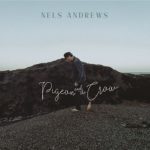 If you want reference points for “Pigeon and the Crow”, I’d go for something between “Sweet Baby James” and “Graceland”. It has the simple, laid-back feel of James Taylor and the experimental rhythms and instrumentation of Paul Simon’s classic. There’s a lot going on, but it never feels cluttered or claustrophobic. There’s something that sets this album apart from the two classics, and it’s the lyrical invention of Nels Andrews’ songs, which are mostly allegorical and metaphorical rather than following straight-line narratives and it makes for a very interesting mixture. It’s a compulsive and beguiling set of songs. And before we move away from the comparisons, you could say that there are hints of Jackson Browne, and Nels’ voice at times sounds a lot like Ian (or Iain) Matthews at the time he was trying to crack the American market in the seventies.
If you want reference points for “Pigeon and the Crow”, I’d go for something between “Sweet Baby James” and “Graceland”. It has the simple, laid-back feel of James Taylor and the experimental rhythms and instrumentation of Paul Simon’s classic. There’s a lot going on, but it never feels cluttered or claustrophobic. There’s something that sets this album apart from the two classics, and it’s the lyrical invention of Nels Andrews’ songs, which are mostly allegorical and metaphorical rather than following straight-line narratives and it makes for a very interesting mixture. It’s a compulsive and beguiling set of songs. And before we move away from the comparisons, you could say that there are hints of Jackson Browne, and Nels’ voice at times sounds a lot like Ian (or Iain) Matthews at the time he was trying to crack the American market in the seventies.
The press pack for the album contains a lyric sheet for the album (it’s in the album packaging as well), but also a very helpful set of writer’s notes for each song, which share the sort of detail you would never pick up on otherwise. “The Lion’s Jaws” is based on the story of an in-law who, at one time, was the only Jewish lion-tamer in history, which is an interesting coincidence, given that Scottish singer-songwriter Dean Owens (recently reviewed here) has also written about a not-too-distant ancestor who was a lion-tamer.
To get some idea of the musical variety of the album, you only need to take a look at the credits. There are thirteen musicians involved and a list of fourteen instruments (not including the many under the umbrella of percussion) from various musical traditions including kora, steel pan, harmonium and flute; it’s not just a lot of instruments, it’s a lot of musical styles melding together seamlessly by producer, flautist and singer Nuala Kennedy.
Highlights? The title song’s hard to beat, with its supernatural love story theme and its lilting Gaelic feel; the opener “Scrimshaw” in triple time and with mid-life memories of happiness and regrets is a perfect evocation of the singer-songwriter genre, and the slightly rockier “Table by the Kitchen” is a fiddle-led, fear-of-missing-out anthem satirising the me generation. What remains in the memory when you reach the end of the album, is the sheer variety of musical settings used to project these songs and support Nels’ mellifluous voice and the way that none of it seems out of place.
“Pigeon and the Crow” is out now.
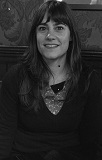 In November 2014, we reviewed “Wild Skies”, Linda Sutti’s debut album, released on Cable Car Records and produced by Henrik Freischlader. Allan was really impressed by the album so when we discovered that Linda was in London for a few days just before Christmas, we sent him out to the wilds of Camden (well, The World’s End) to have a chat with her about her first album, working with Henrik Freischlader, her songwriting influences and a few other things as well. This is what happened:
In November 2014, we reviewed “Wild Skies”, Linda Sutti’s debut album, released on Cable Car Records and produced by Henrik Freischlader. Allan was really impressed by the album so when we discovered that Linda was in London for a few days just before Christmas, we sent him out to the wilds of Camden (well, The World’s End) to have a chat with her about her first album, working with Henrik Freischlader, her songwriting influences and a few other things as well. This is what happened:
AM – So, you’re from Piacenza in Italy, you sing and write in English and your album was produced by a German, Henrik Freischlader; how did that all happen?
LS – I don’t know; I’ve tried to figure out how it worked out but I still don’t know. I had many chances to make music and I was always in love with English as a language and that’s why I started to write in English. Also, I was a member of a blues band and it’s unusual to write Italian blues; as for the German thing, it was just good luck to meet Henrik.
AM – I suppose if you sing in English, it gives you a wider audience as well.
LS – That wasn’t the main reason; I didn’t think of anything other than my love for English music and American-English music and songwriting in general when I was writing my songs.
AM – So that actually brings me quite neatly on to the singers and songwriters you listened to when you were younger; who influenced you?
LS – I loved and I still love the British folk scene, Sandy Denny and Fairport Convention and Donovan and generally the music of the sixties. That’s why I fell in love with folk music after flirting first with the blues.
AM – From the album sleeve notes, it looks like you were into music from a very young age; is that right?
LS – In my very first band, when I was sixteen, I was playing with another musician and we played covers in English and Italian and I wrote two songs in Italian and then, with other musicians we formed a blues band when I was eighteen/nineteen years old.
AM – It also sounds like your family really supported you as well.
LS – Yeah, very much. My father used to play guitar in a band when he was younger; he had a big band called Sunflowers but they weren’t famous at all. It was very fashionable in Italy at that time to have a big band at that time and, yes, my family has supported me all the way.
AM – On your first album, “Wild Skies”, there are some great arrangements from Henrik; did you have a lot of songs before that you were performing before that as solo acoustic songs.
LS – Last October (2013), I was invited to Opole Songwriters Festival in Poland and that was my first chance to play my songs outside Italy.
AM – I’ve been reading a very good book recently, exploring the ways different songwriters work (“Isle of Noises”) and I wondered how you approach songwriting.
LS – I don’t have a particular recipe; I don’t really have a structure. Basically it comes from the music; I start with a chord progression and some words will come out and then I try to fill in the blanks.
AM – A lot of it sounds very personal in the singer/songwriter tradition of the seventies; James Taylor and Carole King. Do you write about your own life?
LS – Yes, of course, from my personal life and from my friends’ life stories because it’s easier to express ideas about being single, for example, if I write while I’m single.
AM – I have to ask; what was it like working with Henrik on the album?
LS – It was great because I really felt from the start that he understood what I wanted to express, not only with my music and songwriting, but also with my idea of being an artist. Also Cable Car Records is very careful about the personality of the artist. It was amazing and I learned many things about music and about working in the studio, so it wasn’t only about making an album, it’s about growing as an artist and a person; it was great.
AM – And he’s a great player, isn’t he?
LS – Yes, he’s amazing and me and the other artists on Cable Car are so lucky because he plays bass, drums and guitar so when you start to work, he knows everything about the song and he has it all in his mind so you can trust him from the start.
AM – I’ve always had this idea that Henrik works that way; he doesn’t think about different parts, he hears the whole thing in his head.
LS – Yeah, it’s amazing. And the backing vocals as well; he does all the backing vocals on the album.
AM – And what was it like touring with Henrik on his final tour?
LS – It was very special because, as you say, it was the last tour, so I was very honoured. I really felt that the audience was very close to him and it was great to be a part of that atmosphere. For me as an artist, it was a great moment and a great occasion to grow and learn.
AM – And I know that Henrik’s audience is open to listening to different styles of music and I imagine they gave you a good welcome.
LS – I was very grateful to play to the audience and I knew that, me and Henrik, we have different styles (and volumes, we all know how powerful the band and Henrik’s playing is) but the audience was great with me because Henrik allowed them to make room for my music. He always introduced me before he played and I appreciated that very much. I think the audience was also prepared because he produced the album (“Wild Skies”).
AM – I think what Henrik has done this year with Cable Car, with Layla Zoe, Tommy Schneller and yourself is great; he’s produced a wide variety of albums and they all work perfectly.
LS – (laughs) Thanks.
AM – The strings on the album were great as well, weren’t they?
LS – It was a particularly moving afternoon when we recorded the strings; they’re played by two musicians, one plays violin and one plays cello and the parts they wrote sound like an orchestra. It was amazing.
AM – So that’s the first album done now, where to next?
LS – I don’t know; I’m still focussed on promoting this one. I hope I’ll be touring this album soon. I have many songs in store but, you know, you have to move one step at a time.
AM – Well, let’s hope we get to see you in the UK sometime soon; that would be something to look forward to.
LS – (laughs) I would love it; I’m ready. If you want me call me, I’m here.
AM – There are certainly a few places in London and around the UK where your music would work really well.
LS – I’m looking for places but there are so many musicians here so I think I may have to wait a while.
AM – Well, we’re looking forward to seeing you.
Earlier this year we reviewed the Chris While and Julie Matthews album, “Who We Are”, so when the time came to put together this year’s High Fives, we asked Chris While for a contribution. Here are her five favourite guitar breaks.
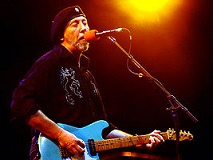 Richard Thompson’s lyrical riffs after the first verse in “Who Knows Where the Time Goes” – Fairport Convention. I know every note of that solo and can’t help humming along with it. Richard is so musical it hurts!
Richard Thompson’s lyrical riffs after the first verse in “Who Knows Where the Time Goes” – Fairport Convention. I know every note of that solo and can’t help humming along with it. Richard is so musical it hurts!
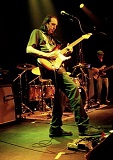 Michael Landau on “Native Son” – James Taylor. Dreamy notes with so much space, I can just listen to that outro again and again.
Michael Landau on “Native Son” – James Taylor. Dreamy notes with so much space, I can just listen to that outro again and again.
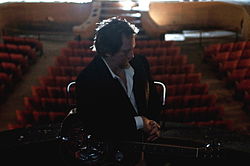 Gerry Douglas on “Forget About It” – Alison Krauss. When he goes into that minor section in the solo, I stop breathing.
Gerry Douglas on “Forget About It” – Alison Krauss. When he goes into that minor section in the solo, I stop breathing.
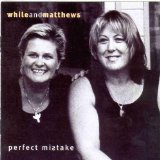 Howard Lees, “Now That Love is Gone” from our album “Perfect Mistake”. I have been playing with this genius player now for 30 years! When Julie Matthews and I recorded this song it ended up being a rumba with a tango bridge. We just gaped at each other when Howard broke into classical Spanish style, there isn’t anything he can’t play – incredible!
Howard Lees, “Now That Love is Gone” from our album “Perfect Mistake”. I have been playing with this genius player now for 30 years! When Julie Matthews and I recorded this song it ended up being a rumba with a tango bridge. We just gaped at each other when Howard broke into classical Spanish style, there isn’t anything he can’t play – incredible!
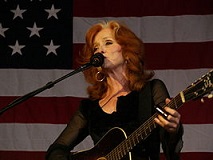 Bonnie Raitt – Just about anything she plays……
Bonnie Raitt – Just about anything she plays……
So it’s time to move on to the second half of the seventies and the early eighties and we start off with the P-word.
AM – How did you react when punk came along then?
PB – Loved it; I actually loved it and weirdly I wanted it to do what it wanted to do because up to that point my heroes were not punk at all and the very antithesis of punk. I wanted it, because I would have been about seventeen then, leaving school, and just starting to think about playing music in pubs and got a band together; well, actually, I got a duet together with Martin Gore (yes, that Martin Gore) and we were trying to write songs. He liked, I don’t know who he liked, I think it was Simon and Garfunkel at the time and he did like Sparks and David Bowie. I liked David Bowie but I wasn’t sure, I didn’t trust him which now, I think, was probably wrong, but I didn’t get the idea that superficial and chameleon-like was his theme. At the time I thought ‘I don’t believe he really means this’ and at that time it had to mean it and that meant a lot to me and I was probably wrong and Gore was probably way ahead of me on that. So we wrote songs which I tried to make melodic and soulful and he wanted to make strange and weird. I taught him how to play guitar and he was a better guitar player than he is, well, what he’s ended up as. We were writing some interesting songs at the time and we went out as this strange band and the punk happened, halfway through this band.
I had hair like Marc Bolan at the time and he had a bubble-cut but we found ourselves on these punk bills. I’d started writing a few songs as well, so I found myself as a solo person on these punk bills for no reason whatsoever because I had nothing to do with punk musically but I liked the fact you could play somewhere and there was energy there and I started listening to other people who were playing and I thought I’ll have a listen to this, so I went along to see some bands. I saw The Buzzcocks, The Ramones and The Talking Heads when they first came over, I saw The Clash once and there was a big fight so I didn’t hear much of The Clash, but that wasn’t the point in a way. I tended to like a what went on afterwards in the post-punk era; I got really well into that because there seemed to be room for bands like Television and The Fall with some of their lyrics which, at that point, were suddenly taking over for me and I went from trying to write songs like James Taylor with three words in them to two chords and “War and Peace” over the top of them; “Ulysses” or something like that, but then there were bands that that was feeding into at the time like The Fall. I certainly got heavily into The Fall and the more experimental bands but I would still listen to “The Modern Dance” by Pere Ubu and then go home and listen to “Mud Slide Slim and the Blue Horizon” by James Taylor because I think that’s what it’s about; they’re not dissimilar in the sense that the person who’s responsible for the music does what he wants it to do. There’s too many categories, in a way.
AM – I know Television, “Marquee Moon”, everybody claims now that it’s always been their favourite album and at the time…
PB – They’re fucking lying; I tried to get everyone into that and a couple of people got it, but for once the rabid NME press was right about this.
AM – For me it’s still one that I’m happy to get the vinyl copy out and stick it on the turntable.
PB – It is actually an album I can listen to at any time and that’s a rare thing. Sometimes, even your favourite albums you think ‘I’m not in the mood for that’, but I can be depressed, I can be happy, I can be whatever, but when Television comes on, that’s it.
AM – So, that was punk, what about what came after that.
PB – Punk was exciting and I was involved in the energy of it; everywhere you went there were gigs. I sounded like Leonard Cohen at that time but anything went and that was the beauty of it. I wore flares and had long hair at the punk gigs I did and it was, sort of, ok. You’d get comments, but that was sort of the point; wait until Dexys Midnight Runners sing about ‘you’re so anti-fashion, wear flares”. You could do anything you liked, it was sort of Dadaist spirit. It was very early on when the fashion thing kicked in, the Kings Road punks, and it was weird because I felt like I’d transcended that because I hadn’t changed. I didn’t even cut my hair so I was like David Crosby amongst the punks.
AM – So presumably when the synthesisers kicked in that wouldn’t really have been your thing.
PB – When the post-punk thing happened, I used to like some of the bands that became known as Krautrock, Can, Neu and the newer ones as well, Deutsch Amerikanische Freundschaft and Einsturzende Neubauten who were pure noise and distortion and the English versions of that like Cabaret Voltaire; I loved all of that. I thought there’s a synth thing going on and Martin got into it, so he buggered off and did Depeche Mode. Suddenly it turned into this really twee pop with no substance. I don’t hate pop music but I thought, with everything he knew, and the stuff he liked, I thought he would have gone towards Throbbing Gristle rather than this thing that happened, which seemed like it was going to be over in five minutes. For all I know he’s now a multi-millionaire and I’m sitting in a pub in Leigh.
AM – It’s a general thing that innovations like that come along, people make really good music and then somebody grabs bits of it for the mainstream and just dilutes it.
PB – That’s always happened. Bob Dylan wouldn’t have been anywhere if it wasn’t for The Byrds; fabulous as that was, I’d rather hear Dylan. I’m probably alone in the world in preferring “All Along the Watchtower” by Bob Dylan to the Hendrix version, even though I like Jimi Hendrix. I’m alone, even Bob Dylan said it’s a better version.
AM – Dylan’s songs have been interpreted by a lot of people; are they better versions or are they different versions?
PB – They’re different versions. Sometimes you can say they’re better versions but the thing I always try to get away from is ‘Dylan’s a fabulous songwriter and an icon of the twentieth century but he can’t sing’. So that means that if Judy Collins or some such does a version of “Idiot Wind”, it will be better, de facto, because she can sing. I could not disagree with anything, outside of UKIP, more vehemently than that. Bob Dylan and Sinatra are probably the best vocal stylists of this millennium. The reason I say that is because you try to play a Bob Dylan song and sing it and not sing a bit like Bob Dylan, not phrase it like him. The same with Sinatra, once you’ve heard “You Make me Feel So Young”, you try and sing that differently. Put your own slant on that; you can’t.
AM – I play and sing badly but I try Dylan songs like “I Shall be Released” and it’s always going to sound like Dylan.
PB – The Band did that; they’ve got some great singers in that band, and it sounded like Dylan; they couldn’t change the phrasing at all. You can sing it in a bland way or you can over-sing it; my worst nightmare is that I’ll wake up and “Positively Fourth Street” is covered by Mariah Carey. She would do it and you can guarantee you would have a queue of people saying ‘Oh, at last this song has been realised by a true singer’, but I would hunt her down and you’d see me on the Six O’Clock News if that happened.
Phil Burdett’s album, “Dunfearing and the West Country High” was reviewed here earlier this year and ever since that time I’ve been waiting for the chance to sit down and have a chat with Phil about his music (and many other things). We finally managed to meet up in Leigh-on-Sea on typically miserable British Bank Holiday weekend and had a pretty expansive chat over a couple of beers. Now that’s the way to do an interview. We covered a lot of ground, so the interview is being published in parts over the next few days.
AM – So Phil, tell us a bit about how you got to be where you are now, musically and philosophically.
PB – I take it you don’t mean the bus route down here. That’s a very good opening question and I’ll do my best to answer it. Musically I would say it’s incremental; it started off with my brother when I was five years old with a guitar and my brother Mick used to have a record collection and he’d lend me his older albums and he was one of those part-time hippies in the late sixties. He went to the Isle of Wight Festival, credit for that, and he had loads and loads of folk music and blues music which was all I heard. Everyone at school was into glam rock and everything so I used to have endless school parties when I was older (obviously not when I was five; great progressive school that would have been). All I would listen to was John Fahey, John Renbourn and probably a bit of the West Coast Neil Young, Topanga County kind of people, James Taylor and those sort of things. And I thought great, this is what’s in the charts, this pop music, then I got school and it was Marc Bolan which was fabulous; I didn’t quite reject everything of my brother’s but I thought, this is what I’m meant to be listening to so I suppose in the early times it was a mixture of Marc Bolan and John Renbourn and then my brother expanded as well into other things like The Band and Van Morrison. Actually, I saw Van Morrison first, although he will tell you different, but I saw him on the Old Grey Whistle Test when he did the “Too Late to Stop Now” thing and they broadcast the whole thing live when they used to do those things, in those days, and I just thought it was music from another planet; I’d never heard anything like it. He had a string section, he had a horn section, he was doing soul music, he was doing blues music, he was doing folky stuff and I can remember a shift happened in my head and I thought ‘this is what I want to do’, and that’s when I wanted to write songs. Not so much to write songs, ‘but I want to make this noise, not to play “Caravan” or “Brown-Eyed Girl”; I want to make this noise with these people. I want to have a bunch of people like this behind me and I want to make this noise.’
AM – Was it the variety of instruments that drew you to it?
PB – It was and, in retrospect, I was quite pleased with that because it was just such an astonishing surprise sometimes you go along to a gig, and you know two numbers in what you’re going to get, whether you like it or not. I like the idea that suddenly you don’t know what’s going to happen next; this could be a folk song, he could pull an acoustic guitar out, he could pull a set of bagpipes out. It could be anything; it could be heavy metal and I loved the idea of that and people like Captain Beefheart. Frank Zappa took it to extremes but I used to love Zappa and probably all the people I’ve liked since that, I’ve liked because of that gig where you thought that anything was possible. You see it now and it flows and it seems like a very good and expansive band playing but at the time I thought that one minute it was classical music, the next minute it was folk music and that’s what I liked it was the variation that made it a whole; it hung together because of the variation. It was astonishing; I sat up after it and I just didn’t know what to do. I wanted to everything but couldn’t do anything.
AM – You mentioned a couple of the musical mavericks there; is there something in you that taps in to that?
PB – I think it all came from that Van Morrison show. Now, I slag off Van Morrison more than anyone does because I think he’s become an appalling thing, an appalling great lump of Irishman. I would rather go and see, and I don’t say this lightly, I would rather go and see a Van Morrison tribute band now than see Van Morrison because it’s the same thing essentially; I think he’s lost the plot or never had the plot and got lucky. His first four or five albums up to “Veedon Fleece” and a little bit beyond were fantastic but suddenly it all went very wrong. When he was inventive and varied, which was probably before I got in to the idea of lyrics, and that’s evolved more than the music side, he was just purely making music and making sounds for the joy of it; I think Van Morrison expresses that if I don’t care about lyrics, because he’s not the greatest lyricist in the world, it’s perfect. “Astral Weeks”, it’s errant nonsense a lot of it but you couldn’t change a word of it. What the fuck is “Veedon Fleece”? What is a Veedon Fleece? But you wouldn’t want it any other way. I’m not religious, I’m an atheist, but I believe that; I want to go and search for the Veedon Fleece when I’m hearing that, so it works. It was that combination of trust in him, you believed in what he did, and his voice, which was peerless at that time. I used to try to do the Van Morrison bit with a bit of Bob Dylan thrown in. My brother tried to get me into Bob Dylan more and I said that Van Morrison was the man, and then suddenly the thing that changed it was Bob Dylan and Robbie Robertson. I heard The Band’s first album and, for no reason whatsoever, I just loved and then I realised that the reason I loved it was because of these words. It’s not the way they were being sung, although that was fabulous, it was these words and I didn’t know what they meant, but they sounded like they meant something and it was probably a combination of those things; Dylan, the Band and Van Morrison.
AM – I was going to come to this a bit later, but the first time I listened to “Dunfearing and the West Country High” I pulled the lyric booklet out and it was obvious that there were an awful lot of lyrics there.
PB – I get hell from record companies for that, especially from the people that type the lyrics out.
AM – But it was doing that and actually reading the lyrics that I realised you’re obviously a writer who is influenced by poetry as well.
PB – In a way, poetry came before lyrics because I used to like poetry before music. When I first heard music, the lyrics were part of the music, of the sound. They could have been singing anything and in some cases they were. People talk about Nick Drake, but I think Nick Drake’s a terrible lyricist. I’ll get crucified for this, but if his music and his sound wasn’t as good as it is, if musically he was someone like Donovan, then the lyrics aren’t that different; it becomes mystical because of the setting rather than the content.
AM – What struck me as well is that the lyrics on “Dunfearing…” actually repay careful listening.
PB – That’s what you want. That’s the reason I want to write short stories, I want to write books, I want to write everything, but I’m writing this music because it’s the only thing I can see, outside of opera, that’s taken seriously (not seriously enough, in my opinion) because it’s a combination of music and lyrics that would not work separately. I’m not a great lover of the idea that lyrics are poetry; I think lyrics are lyrics but they can be good lyrics. Poetry’s another thing; poetry should be able to stand alone. If you have as good a lyric as “Idiot Wind” and Bob Dylan wanted to do that as a poem, I think he would rewrite it, but he shouldn’t rewrite it; it’s got to complement the music.
AM – For the first time in years listening to a new album, I went into sixth form English Literature criticism mode.
PB – My album will be on the curriculum next year; I trust Gove.
AM – You’ve seen the review, it got that reaction because there was so much in there lyrically.
PB – Your review astonished me; my first reaction was that I thought it was a wind-up and that Phil Pavling (described in the sleevenotes as guru and benefactor) had written it or I thought I’d written it and forgotten and posted it to myself. You don’t get that often, you think ‘That’s nice, we’ll use that line for a plug or something’, but this was almost like you knew as much as I did about what was going on, which is very rare.
AM – That was just my natural reaction to the album, really. The other thing was that my wife, who wouldn’t necessarily have chosen to listen to it, being much more into disco, gave it a big thumbs up as well.
PB – My disco album will come a lot later.
And that’s end of part one, more to come very soon, when we get into punk, post-punk and post-post-punk, among other things.


